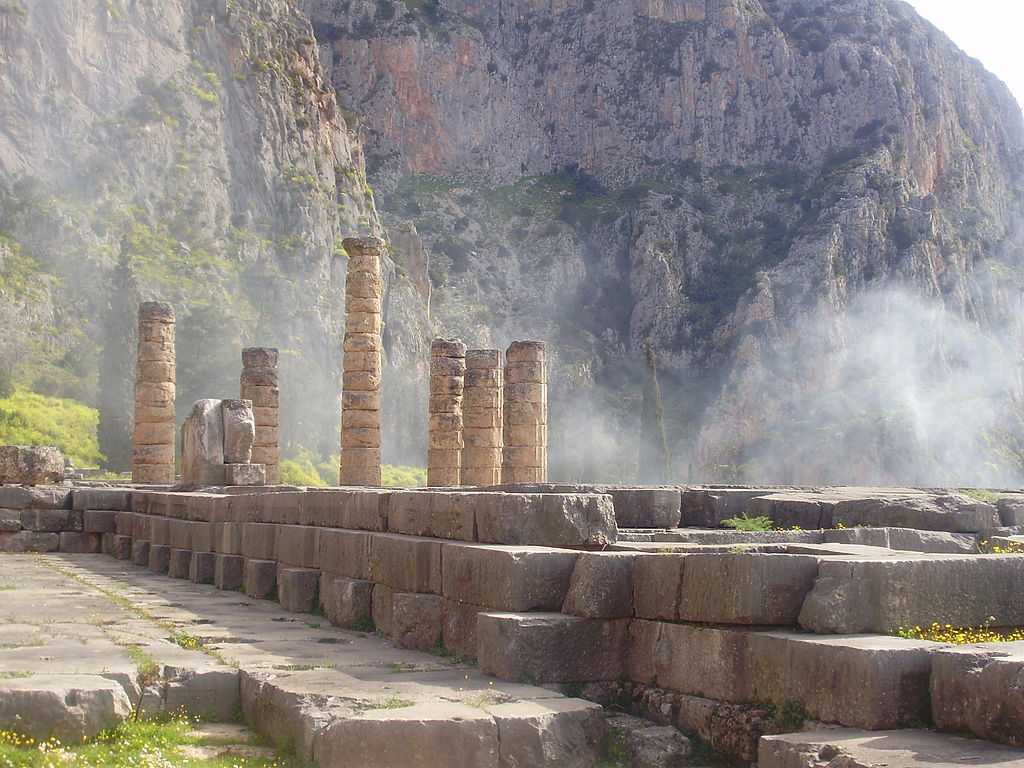PRELUDE: A Quest
After a long and winding climb out of the valley of the Pleistos river, heading ever northward toward the foothills of the great Mount Parnassus, Chaerephon (pronounced “kerefen”), the devoted disciple of the philosopher Socrates, spied the huge rock formations the Greeks called the Phaedriades. He knew his quest was nearly over.
Weeks ago, in his zeal to prove his teacher the “wisest man in Greece,” he had left Athens to seek a prophecy from the famed Oracle of Delphi. Now, as he drew near her sanctuary, Chaerephon felt a rising anxiety. What if he was wrong? What if the Oracle instead declared his teacher a fool or a charlatan, this teacher he had been following for so many years now? What if….? No, he could not let himself doubt now. He must approach the Oracle with conviction.

He looked up from his reveries to find himself before the temenos or sacred grove of Athena Pronaia, the goddess who once ruled this holy site before it was taken by Apollo. He dared not dwell there for fear of upsetting the Sun God. (No doubt his teacher would have laughed at this caution!) Instead, he made his way to the winding stairs, the Sacred Way, leading up to the great Temple of Apollo.
As he climbed, he thought of his friend and mentor, a brilliant yet often controversial man. Socrates, though seeking only the best in people, had no shortage of enemies who found him rude at best and dangerous at worst. With luck, Apollo’s Oracle would endorse the master’s mission and win him more friends in Athens.
Suddenly, he found himself standing amid the tall marble pillars, feeling quite small. Above him, etched into the marble of the entryway, were the words γνῶθι σεαυτόν, “Know Thyself.” In many ways, this was the heart of the master’s teachings as well. To know oneself is to know the world.
Inside, temple priestesses sat in shadowy corners uttering soft, whispered prayers or tending sconces of flame that lit the interior with an otherworldly glow. There, at the far end of the peripteros he saw the adyton, the small, enclosed room in which, he knew, the Oracle, The Pythia, sat upon her three-legged stool, ready to utter the often-unintelligible words of the God.
The gloom of the place was unnerving. The space was designed to evoke a sense of the supernatural. This was not just any common prophetess, this was the messenger of Apollo. Rumor had it that the Pythia was not much older than a child, a young virgin chosen by her priestess sisters as the most receptive to the God’s voice. It was also whispered that fumes from a fissure beneath the complex aided the young priestess in entering the trance that would allow her to hear that Voice.

The priestesses took from him the required “donation” of gold drachmas and instructed him on the proper kinds of questions to ask the Oracle. But Chaerephon was not here to ask the usual questions–about the future, about prosperity, about family. As he stepped close to the sacred door, he had but one question for Apollo:
“Is there in Greece anyone wiser than Socrates?”
The Oracle was silent for what seemed like hours.
Then she uttered “There is no man wiser.”

